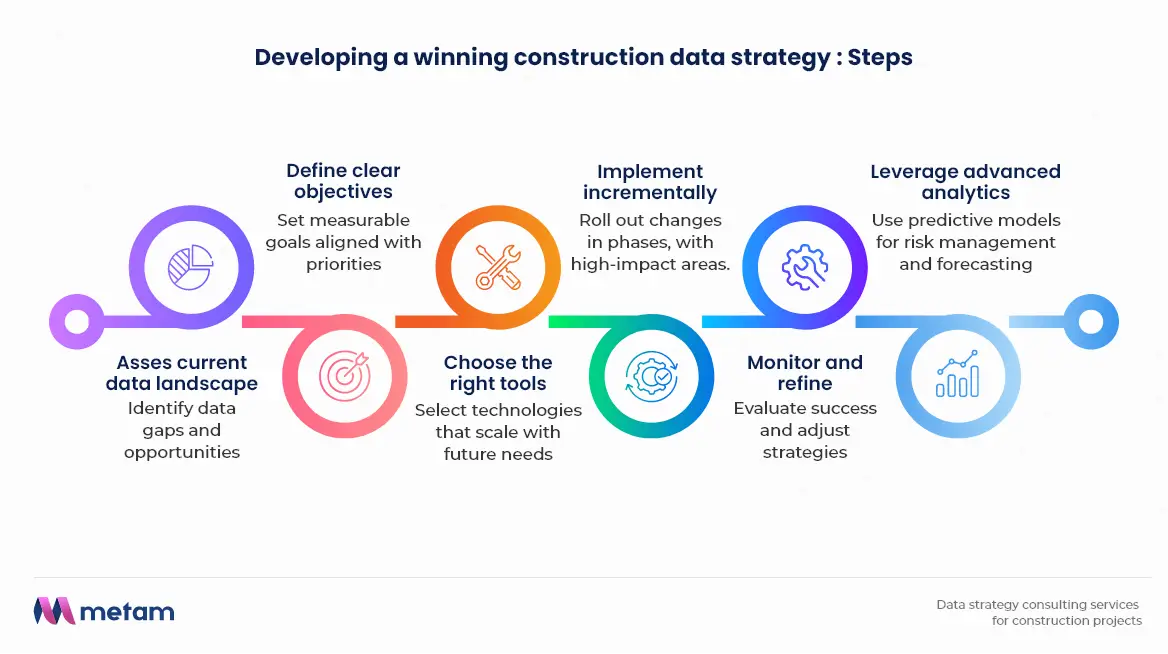
Selecting the right data strategy partner is essential for construction firms to optimize operations, enhance sustainability, and tackle industry challenges like labor shortages and project complexity. Key benefits of data strategies include cost savings, risk mitigation, and improved decision-making, with guidance on choosing a tailored consulting solution.
Choosing the right data strategy consulting partner for construction projects is more critical than ever. As the industry faces rapid technological advancements and growing demands for sustainability and efficiency, construction companies are under increasing pressure to optimize their operations. However, fragmented data systems often hinder the ability to derive actionable insights from the vast amount of data generated daily.
With over 382,000 job openings monthly in the U.S. construction sector between August 2023 and July 2024, the industry is under pressure to optimize operations and resource management. This shortage, coupled with the increasing complexity of projects, highlights the urgent need for a robust data strategy to streamline decision-making and improve efficiency. (Source : Gallagher Basset)
This article explores the essential role of data strategy consulting services in the construction industry and provides actionable guidance to help businesses select the perfect consulting partner.
The construction industry produces an enormous volume of data daily, including project schedules, cost estimates, safety metrics, and inventory records. Yet, much of this data remains underutilized due to poor integration and lack of strategic frameworks. Data strategy consulting services bridge this gap, converting raw data into actionable insights that enhance decision-making.
Data strategy consulting services in construction provide immense value by aligning project goals with efficient data management practices:
Effective data strategy consulting in construction combine advanced technologies with industry-specific expertise to address the unique challenges of the sector. These services ensure that data-driven decisions align with project goals and enhance overall efficiency.
These are key features of effective data driven strategy consulting for construction projects:
Selecting the right construction data strategy partner is a critical step in maximizing data's value. The ideal partner brings a blend of industry expertise, technological proficiency, and a proven track record of delivering measurable outcomes.
To ensure the right partner is selected, here are the key traits to look for:
A data strategy partner with strong expertise in the construction industry is essential, as they can navigate the unique challenges, regulatory demands, and complexities of project management that impact daily operations. A partner with deep knowledge of construction-specific needs, such as managing large-scale infrastructure projects, navigating compliance requirements, or understanding the lifecycle of construction data, will deliver more impactful solutions.
This expertise allows them to craft tailored strategies that directly align with construction business objectives and help overcome common industry hurdles like budget overruns, labor shortages, and tight project deadlines. Industry-specific knowledge is especially crucial for implementing real-time data monitoring tools that support proactive decision-making.
Data strategy in construction increasingly hinges on integrating emerging technologies like Artificial Intelligence (AI), Internet of Things (IoT), Building Information Modeling (BIM), and advanced data analytics tools. A leading partner should have proven expertise in utilizing these technologies to collect, analyze, and visualize data in real-time.
For example, AI-driven predictive analytics can forecast potential delays, while IoT sensors can provide constant feedback on equipment and material usage, improving supply chain efficiency and reducing downtime. Look for case studies or customer testimonials that showcase successful deployments of these technologies in similar construction projects.
In the fast-evolving construction landscape, each project comes with unique requirements. It is crucial to avoid partners who offer generic, one-size-fits-all solutions. Instead, firms that provide customizable data strategies tailored to specific needs, project goals, and scale are essential. Whether improving cost estimation accuracy, streamlining scheduling, or integrating environmental impact tracking, an ideal partner should have the flexibility to design and scale solutions that seamlessly fit project workflows.
A bespoke approach ensures that solutions align with organizational goals and adapt as the business grows or faces new challenges, particularly with the industry's increasing focus on sustainable building practices and the adoption of digital twins.
A trustworthy data strategy partner will be transparent about how their solutions will deliver measurable value. Look for partners that track clear Key Performance Indicators (KPIs) and provide tangible evidence of ROI. For instance, they should demonstrate how their strategies contribute to enhanced cost control, improved project timelines, better resource utilization, and overall profitability.
Additionally, a reliable partner will provide actionable insights and regular reporting to help monitor the success of data-driven strategies and make data-informed decisions moving forward.
A competent data strategy partner must prioritize robust cybersecurity measures and adhere to industry-specific data protection regulations, such as GDPR and the California Consumer Privacy Act (CCPA). They should ensure that the company’s data is stored securely, with appropriate access controls in place, minimizing risks associated with cyber threats and data breaches.
Compliance with regulations such as OSHA (Occupational Safety and Health Administration) and EPA (Environmental Protection Agency) standards is equally important, especially when integrating data systems that track worker safety or environmental impact.
Evaluate the potential partner’s experience in delivering successful outcomes for similar construction firms. Whether through client case studies, industry awards, or client testimonials, the ideal partner should have a proven track record of helping businesses overcome challenges.
Their experience should reflect the ability to navigate complex projects, align data with business goals, and deliver results that enhance both short-term performance and long-term strategic growth.
The future of construction data strategy services is defined by innovation and adaptation. These trends are set to dominate in the coming years:
Building a robust data driven strategy requires careful planning and execution. Follow these steps to ensure success:

Selecting the right data driven strategy consulting partner is essential to staying ahead in a competitive industry.
Metam Technologies specializes in offering customized data strategy consulting services, designed to meet the unique needs of construction projects. Our expertise in predictive analytics, real-time data insights, and sustainability metrics enables businesses to harness the power of data for operational excellence. With a deep understanding of the construction industry’s challenges, Metam Technologies is the ideal partner to help construction companies navigate these complexities.
Get in touch with Metam Technologies today and explore how we can help construction projects achieve sustainable growth, enhanced efficiency, and success through tailored data strategies.


